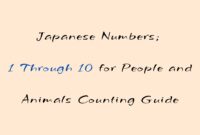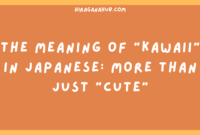Expressing love can be a nerve-wracking experience. It’s not just about
confessing romantic love; people also express love to their parents, siblings,
and close friends. While we may be used to saying “I love you” in our native
language, expressing feelings in Japanese can be just as romantic, if not
more!
Many people believe that “aishiteru” (愛してる) is the standard way to say “I
love you” in Japanese. This phrase is so popular that it has even been used in
song lyrics. However, did you know that native Japanese speakers rarely use
“aishiteru”? Instead, there are various ways to express love in Japanese, each
with different nuances. Let’s explore why “aishiteru” is not commonly used and
what other expressions are more natural.

Understanding Aishiteru (愛してる)
While “aishiteru” literally means “I love you,” Japanese people consider this
phrase to be very deep and serious. Unlike in Western cultures, where saying
“I love you” is common even in early stages of a relationship, Japanese people
tend to be more reserved when expressing love.
The word 愛 (ai) means “love,” and “aishiteru” is generally
reserved for long-term relationships, typically after marriage or in deeply
emotional moments. Because of its weight, most people prefer alternative
expressions to convey their feelings more naturally.
If you want to avoid sounding overly dramatic, check out these other ways to
say “I love you” in Japanese.
Alternative Ways to Say ‘I Love You’ in Japanese
Besides “aishiteru,” there are several other ways to express love in Japanese.
These phrases range from casual to more serious expressions and are commonly
used by people in romantic relationships.
1. Suki da (好きだ) – “I Like You”
“Suki da” means “I like you”, but in a romantic context, it
expresses affection similar to saying “I love you” in English. It’s one of the
most common ways to confess your feelings to someone.
This phrase is lighter than “aishiteru” and can be used at the beginning of a
relationship or even between long-term partners. Young people often use “suki
da” to express their emotions without sounding too intense.
2. Daisuki da (大好きだ) – “I Really Like You” / “I Love You”
To emphasize stronger feelings, you can say “daisuki da.” The word
大 (dai) means “big” or “great,” making “daisuki da” mean
“I really like you” or
“I love you very much.”
This phrase is stronger than “suki da” but still less formal than “aishiteru.”
It’s commonly used between couples and even among close family members and
friends.
3. Koishiteru (恋してる) – “I Am in Love”
Another heartfelt way to convey your feelings is by saying “koishiteru,”
which has a depth akin to “aishiteru.” It translates directly to “I am in
love with you.”
Like “aishiteru,” this phrase carries a very serious and romantic tone and is
not commonly used in daily conversation. Instead, it is often found in poetry,
literature, or dramatic love confessions.
4. Anata ni muchuu desu (あなたに夢中です) – “I Am Crazy
About You”
If you want to express deep admiration and infatuation, you can say
“Anata ni muchuu desu,” which means
“I’m crazy about you.”
This phrase conveys strong emotions and is best used when you are deeply in
love with someone.
5. Suki yanen (好きやねん) – Kansai Dialect Expression
People in the Kansai region often use “suki yanen” rather than the phrase
“suki da.” If you’re interested in speaking in the style of Osaka locals,
this expression will create a warmer and more local impression when you
express your feelings.
6. Kanasandoo (カナサンドー) – Okinawan Dialect Expression
In Okinawa, people say “kanasandoo” to express love. This
phrase is similar to “aishiteru” but is specific to the Okinawan dialect.
Romantic Phrases in Japanese
Expressing love isn’t just about saying “I love you.” Here are some romantic
phrases you can use in different situations:
| Japanese | Romanization | Meaning |
|---|---|---|
| あなたは、優しいね | Anata wa yasashii ne | You are so kind. |
| ずっと、好きでした | Zutto suki deshita | I have always liked you. |
| 愛してます | Aishitemasu | I love you. |
| 付き合ってください | Tsukiatte kudasai | Please go out with me. |
| 付き合って いただけませんか? | Tsukiatte itadakemasen ka? | Would you like to be my boyfriend/girlfriend? |
| デートに行きませんか? | Deeto ni ikimasen ka? | Shall we go on a date? |
| きれいな赤いバラをどうぞ | Kireina akai bara wo doozo | Here’s a beautiful red rose for you. |
| あなたを幸せにします | Anata wo shiawase ni shimasu | I will make you happy. |
| 結婚していただけませんか? | Kekkon shite itadakemasen ka? | Will you marry me? |
How to Say “I Love You Too” in Japanese
If someone confesses their love to you, here are some ways to respond:
-
Watashi mo aishiteru (私も愛してる) – “I love you too.”
(Serious and deep) -
Boku mo suki da (僕も好きだ) – “I like you too.” (Casual,
used by men) -
Watashi mo daisuki (私も大好き) – “I really like you
too.” (Common and affectionate) -
Ore mo suki da (俺も好きだ) – “I like you too.” (Casual,
masculine) -
Kimi mo daisuki (君も大好き) – “I really love you too.”
(More intimate and friendly)
Final Thoughts
Japanese people express love differently than in Western cultures. Since
“aishiteru” is rarely used, choosing the correct phrase is essential,
depending on the situation. Whether you’re confessing feelings, showing
affection, or responding to someone’s love confession, using the correct
expression can help make your message more natural and heartfelt.
Now that you’ve learned how to express love in Japanese, do you know how to
express happiness or sadness? Learn more on Hiraganahub.com!



